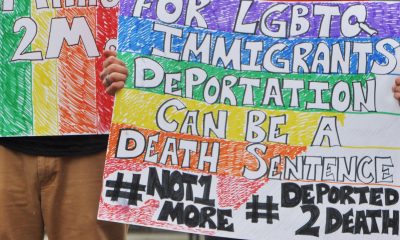National
U.S. balks at asylum for gay Saudi diplomat
Attorney says client faces ‘certain’ execution


The US Department of Homeland Security issued a preliminary ruling last week withholding political asylum for a gay Saudi diplomat
The U.S. Department of Homeland Security issued a preliminary ruling last week withholding political asylum for a Saudi diplomat whose colleagues discovered he’s gay last year while he was assigned to Saudi Arabia’s consular office in Los Angeles.
The diplomat, Ali Ahmad Asseri, who served as first secretary to the consular office, applied for U.S. asylum in 2010 under a U.S. policy that offers asylum to foreign nationals belonging to a “particular social group,” including gays, who face persecution in their home country.
“It’s not a matter to be taken lightly and I’m sure the U.S. government is not taking it lightly,” said Ally Bolour, an American attorney representing Asseri. “It’s certain death,” he said, if his client is forced to return to Saudi Arabia.
ALSO IN THE BLADE: U.S. SENATOR BLUMENTHAL SEEKS TO AID LESBIAN BI-NATIONAL COUPLE
Bolour noted that gay sex is considered a crime punishable by execution under Saudi Arabia’s fundamentalist Islamic law. He said the country’s prosecutors routinely trump up sex-related charges against Saudi gays, effectively making homosexuality itself grounds for execution.
A recent U.S. State Department human rights report on Saudi Arabia says that under the country’s Islamic or Sharia law, consenting sexual relations between people of the same sex is “punishable by death or flogging.”
The DHS didn’t immediately respond to a request for comment on Asseri’s asylum case. DHS has said in the past that it never comments on pending cases. An official at the State Department, which has listed Saudi Arabia among countries that persecute gays, also declined to comment, saying it doesn’t discuss pending cases.
Bolour said that as part of its routine procedure for asylum cases, the DHS referred Asseri’s case to an immigration judge for an automatic appeal. He said he’s hopeful that the judge, on behalf of a special U.S. immigration court, will approve the asylum application. Should the judge deny the application, Asseri will appeal the case to the U.S. Court of Appeals, Bolour said.
“There’s a process that these things go through,” he said. “It was not approved in the first instance when we applied. Obviously, I think it should have been approved. But it hasn’t been denied and so we’re still on course.”
Bolour declined to provide details on how the Saudi consular office in Los Angeles discovered that Asseri is gay.
LGBT AND MUSLIM GROUPS WORK TOGETHER IN MICHIGAN TO SAVE ANTI-BULLYING LAW FROM RELIGIOUS EXEMPTION
However, he told the Blade that an MSNBC News report in September 2010 that first reported Asseri’s request for U.S. political asylum accurately reported on the details of the case as of a year ago.
According to the MSNBC report, Asseri told the broadcast news outlet that he had worked for the Saudi consular office in L.A. for five years. He told MSNBC that he discovered several months before filing his asylum application that Saudi consulate employees, who suspected he was gay, followed him to gay bars.
“It was sometime after these discoveries, Asseri said, that consulate officials began harassing him, refusing to renew his diplomatic passport or provide him with badly needed medical treatment for a painful back ailment,” MSNBC reported.
Consulate officials also demanded that he return to Saudi Arabia, MSNBC reported.
WEB EXCLUSIVE: VICTORIA JACKSON UPSETS GAYS, MUSLIMS IN NEW VIDEO
“My life is in great danger and if I go back to Saudi Arabia, they will kill me openly in broad daylight,” MSNBC quoted him as saying in September 2010.
News of the DHS preliminary decision to withhold approving Asseri’s asylum application was first reported last week by Saudi American journalist and blogger Rasheed Abou-Alshamh on his blog RasheedsWorld.com.
Abou-Alshamh reported in his blog that a Saudi dissident in Washington named Ali al-Ahmed told him the decision to withhold Asseri’s asylum request was “a political decision by the Obama administration,” which, according to al-Ahmed, is “afraid of upsetting the Saudis.”
In his blog posting, Abou-Alshamh did not disclose al-Ahmed’s source or sources for his claim that the Obama administration orchestrated the withholding of the asylum request based on an alleged desire not to offend Saudi Arabia.
Attorney Bolour called the claim “outrageous” and “ludicrous,” saying the DHS decision to refer the asylum application to an immigration court judge is a routine bureaucratic procedure far removed from the White House or the president.
According to the DHS website, an initial decision on an asylum case is made by an asylum officer with the U.S. Citizenship and Immigration Services, which is an arm of the DHS.
Officials with the LGBGT advocacy groups Lambda Legal and Immigration Equality said they were following the Asseri case even though they were not directly involved. Immigration Equality Legal Director Victoria Neilson said the case was unusual because it’s rare that a diplomat like Asseri applies for U.S. asylum on grounds of anti-gay persecution.
U.S. Supreme Court
Supreme Court to consider bans on trans athletes in school sports
27 states have passed laws limiting participation in athletics programs

The U.S. Supreme Court on Thursday agreed to hear two cases involving transgender youth challenging bans prohibiting them from participating in school sports.
In Little v. Hecox, plaintiffs represented by the ACLU, Legal Voice, and the law firm Cooley are challenging Idaho’s 2020 ban, which requires sex testing to adjudicate questions of an athlete’s eligibility.
The 9th U.S. Circuit Court of Appeals described the process in a 2023 decision halting the policy’s enforcement pending an outcome in the litigation. The “sex dispute verification process, whereby any individual can ‘dispute’ the sex of any female student athlete in the state of Idaho,” the court wrote, would “require her to undergo intrusive medical procedures to verify her sex, including gynecological exams.”
In West Virginia v. B.P.J., Lambda Legal, the ACLU, the ACLU of West Virginia, and Cooley are representing a trans middle school student challenging the Mountain State’s 2021 ban on trans athletes.
The plaintiff was participating in cross country when the law was passed, taking puberty blockers that would have significantly reduced the chances that she could have a physiological advantage over cisgender peers.
“Like any other educational program, school athletic programs should be accessible for everyone regardless of their sex or transgender status,” said Joshua Block, senior counsel for the ACLU’s LGBTQ and HIV Project. “Trans kids play sports for the same reasons their peers do — to learn perseverance, dedication, teamwork, and to simply have fun with their friends,” Block said.
He added, “Categorically excluding kids from school sports just because they are transgender will only make our schools less safe and more hurtful places for all youth. We believe the lower courts were right to block these discriminatory laws, and we will continue to defend the freedom of all kids to play.”
“Our client just wants to play sports with her friends and peers,” said Lambda Legal Senior Counsel Tara Borelli. “Everyone understands the value of participating in team athletics, for fitness, leadership, socialization, and myriad other benefits.”
Borelli continued, “The U.S. Court of Appeals for the Fourth Circuit last April issued a thoughtful and thorough ruling allowing B.P.J. to continue participating in track events. That well-reasoned decision should stand the test of time, and we stand ready to defend it.”
Shortly after taking control of both legislative chambers, Republican members of Congress tried — unsuccessfully — to pass a national ban like those now enforced in 27 states since 2020.
Federal Government
UPenn erases Lia Thomas’s records as part of settlement with White House
University agreed to ban trans women from women’s sports teams

In a settlement with the Trump-Vance administration announced on Tuesday, the University of Pennsylvania will ban transgender athletes from competing and erase swimming records set by transgender former student Lia Thomas.
The U.S. Department of Education’s Office for Civil Rights found the university in violation of Title IX, the federal rights law barring sex based discrimination in educational institutions, by “permitting males to compete in women’s intercollegiate athletics and to occupy women-only intimate facilities.”
The statement issued by University of Pennsylvania President J. Larry Jameson highlighted how the law’s interpretation was changed substantially under President Donald Trump’s second term.
“The Department of Education OCR investigated the participation of one transgender athlete on the women’s swimming team three years ago, during the 2021-2022 swim season,” he wrote. “At that time, Penn was in compliance with NCAA eligibility rules and Title IX as then interpreted.”
Jameson continued, “Penn has always followed — and continues to follow — Title IX and the applicable policy of the NCAA regarding transgender athletes. NCAA eligibility rules changed in February 2025 with Executive Orders 14168 and 14201 and Penn will continue to adhere to these new rules.”
Writing that “we acknowledge that some student-athletes were disadvantaged by these rules” in place while Thomas was allowed to compete, the university president added, “We recognize this and will apologize to those who experienced a competitive disadvantage or experienced anxiety because of the policies in effect at the time.”
“Today’s resolution agreement with UPenn is yet another example of the Trump effect in action,” Education Secretary Linda McMahon said in a statement. “Thanks to the leadership of President Trump, UPenn has agreed both to apologize for its past Title IX violations and to ensure that women’s sports are protected at the university for future generations of female athletes.”
Under former President Joe Biden, the department’s Office of Civil Rights sought to protect against anti-LGBTQ discrimination in education, bringing investigations and enforcement actions in cases where school officials might, for example, require trans students to use restrooms and facilities consistent with their birth sex or fail to respond to peer harassment over their gender identity.
Much of the legal reasoning behind the Biden-Harris administration’s positions extended from the 2020 U.S. Supreme Court case Bostock v. Clayton County, which found that sex-based discrimination includes that which is based on sexual orientation or gender identity under Title VII rules covering employment practices.
The Trump-Vance administration last week put the state of California on notice that its trans athlete policies were, or once were, in violation of Title IX, which comes amid the ongoing battle with Maine over the same issue.
New York
Two teens shot steps from Stonewall Inn after NYC Pride parade
One of the victims remains in critical condition

On Sunday night, following the annual NYC Pride March, two girls were shot in Sheridan Square, feet away from the historic Stonewall Inn.
According to an NYPD report, the two girls, aged 16 and 17, were shot around 10:15 p.m. as Pride festivities began to wind down. The 16-year-old was struck in the head and, according to police sources, is said to be in critical condition, while the 17-year-old was said to be in stable condition.
The Washington Blade confirmed with the NYPD the details from the police reports and learned no arrests had been made as of noon Monday.
The shooting took place in the Greenwich Village neighborhood of Manhattan, mere feet away from the most famous gay bar in the city — if not the world — the Stonewall Inn. Earlier that day, hundreds of thousands of people marched down Christopher Street to celebrate 55 years of LGBTQ people standing up for their rights.
In June 1969, after police raided the Stonewall Inn, members of the LGBTQ community pushed back, sparking what became known as the Stonewall riots. Over the course of two days, LGBTQ New Yorkers protested the discriminatory policing of queer spaces across the city and mobilized to speak out — and throw bottles if need be — at officers attempting to suppress their existence.
The following year, LGBTQ people returned to the Stonewall Inn and marched through the same streets where queer New Yorkers had been arrested, marking the first “Gay Pride March” in history and declaring that LGBTQ people were not going anywhere.
New York State Assemblywoman Deborah Glick, whose district includes Greenwich Village, took to social media to comment on the shooting.
“After decades of peaceful Pride celebrations — this year gun fire and two people shot near the Stonewall Inn is a reminder that gun violence is everywhere,” the lesbian lawmaker said on X. “Guns are a problem despite the NRA BS.”
-

 U.S. Supreme Court2 days ago
U.S. Supreme Court2 days agoSupreme Court to consider bans on trans athletes in school sports
-

 Out & About2 days ago
Out & About2 days agoCelebrate the Fourth of July the gay way!
-

 Virginia2 days ago
Virginia2 days agoVa. court allows conversion therapy despite law banning it
-

 Maryland4 days ago
Maryland4 days agoLGBTQ suicide prevention hotline option is going away. Here’s where else to go in Md.












